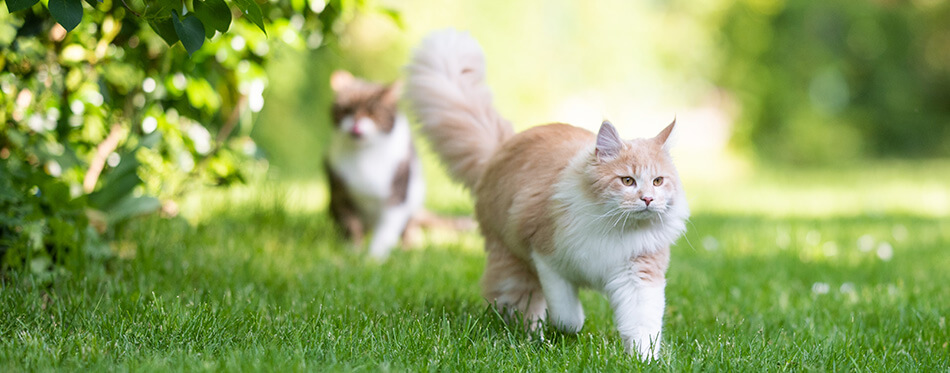If you are a dog owner, then your pooch bounding towards you as you call his name is a familiar and heartwarming sight. But it’s a totally different experience with a cat, who may react with disdain – or even ignore you altogether.
This lack of feline response leads to the question – do cats really know their names? Well, scientific reports say they can, it’s just that they often choose not to respond. Here’s why.
Cats do Recognize their Own Name
A 2019 study conducted by researchers at Tokyo Sophia University has shown that cats can distinguish their own names from other words and have an ability to understand a human voice and its verbal cues.
And they can also respond to their own names, even if it is called out by a stranger as well as distinguish it from other cats.

Do Cats Understand their Names?
Behavioral scientist Atsuko Saito conducted her new study by observing 78 house cats as well as other cats living in cat cafes across Japan to discover whether cats recognize their names.
Both strangers and owners were instructed to call out the cats’ names and any physical responses, including swishing tails, an ear twitch, and head movements as well as direct reactions, were recorded.
The Four Words Test
Then the strangers and owners called out four words that sounded similar to the cats’ own names as well being of the same length and cadence and again, recorded whether the cats responded and what those cats’ responses were.
From how the cats responded to these similar words, the Sophia University team concluded that domestic cats recognize their own names and can distinguish it from the other four similar sounding words. Most cats can also respond to their name, more specifically when said in their owner’s voice but even if it is called out by a stranger.
But the behavioral scientist was unable to conclude whether individual cats understood their name as a personal identity or whether the specific word was associated with a behavior or behaviors.
What does a Name Mean to a Cat?
A simple explanation as to whether a cat knows its own name or not, is that they react to the name as it is the word their humans say most frequently and directly to them. The verbal use of a name can also become associated in a cat’s mind with something positive, say a tummy rub or a tasty treat, which answers the question, can cats learn their names?
The Japanese researchers also discovered that domestic cats can also distinguish their own names from other cats’ names.
Other words, such as ‘jump’, ‘sit’ or ‘come here’ can also be understood by a cat, but this could be because their humans are also using clear physical clues such as hand gestures as well as vocal cues to confirm what they are wanting their kit to do.
Saito’s previous research had already revealed that cats can interpret human gestures in order to find hidden food as well as beg for tasty treats from someone who directly calls their name.
Positive Connotations
This response to individual words throws into question whether a cat can distinguish a specific name as theirs, or whether they are simply reacting to familiar or similar words, as well as voice, and tone. In short, it is a word or is it their identity a cat is responding to?
A name is a social construct that we humans happily attach to our pets. But for your cat, while he has no real sense of social identity, a name can become something that is special to him due to the positive connotations it holds.
Cats Know their Owner’s Voice
Sophisticated hunters with an innate survival instinct, cats are constantly paying attention to their environment and surroundings, even if it feels like they haven’t even noticed you.
But they are also social creatures, albeit on their own terms, and they do develop bonds with their human family which in turn, feeds them a lot of information.
That includes an ability for vocal recognition. And it is a familiar voice speaking a recognizable word that just happens to be a cat’s name and has positive connotations that help with their information gathering, rather than their basic reaction to what is their ‘name’.

Why Cats don’t Respond in the Same Way as a Dog
As reported in National Geographic, the Japanese study also highlighted the difference between felines and canines when it came to name recognition. And the researchers concluded that the main difference is dogs are programmed to respond to their name from a very young age.
A Matter of Training
For thousands of years, domestic dogs were bred for a purpose, whether that was as hunting, guarding, fighting or herding animals, and at their heart of this was the need for obedience.
We still train dogs from an early age, send them to ‘obedience school’ and spend time in situations with dogs where we need to be in control. Dogs are also more directly companion animals – we take them out on walks for example – and so one of the very first words they learn to respond to is their name.
Felis Catus – or today’s pet cats – on the other hand, came a little later to the domestic animals’ party, and has a more free-range existence which is not so closely entwined with humans from a work and obedience/training perspective.
And so, while many cats recognize words, responding to an actual name is not so deeply engrained in your average feline.
Do Cats Deliberately Ignore you?
The independent nature of cats means that just because you want a specific reaction or action from your feline pet, it doesn’t necessarily mean you will get one! They are simply not wired in the same way as a dog, who is willing and able to respond immediately to his name, as it’s what he has been trained to do.
Your cat will most likely hear your voice and recognize his name and the tone it has been spoken in, but their reaction will not necessarily be driven by a desire to please you.
Your pet will be taking into account his own needs, motivation or simply how they feel at that moment. And so, hearing you call their name may simply not be enough to provoke a reaction!
But you could see clues in their body language that your kit has heard, including twitching ears (even if they are not looking at you) or a leisurely swish of their tail.
But if they think the reward – a treat, food, petting session or chance to play with a teaser toy – is enough to warrant them moving, then your cat will reward you by responding.
How to Train Your Cat to Respond to their Name
While the uniquely independent nature of cats is what makes them so special, it is possible to train cats to be more responsive when you call out them and even recognize their names.
So, now that we have the answer to the question: ‘do cats respond to their names?’, here’s how to increase the chances of a favorable reaction from your fickle pet:
Use their Name Consistently
By using their own names frequently throughout the day and with everything you do with your kits, you are building on their willingness for name recognition.
And make sure you are consistent with their name when cats associate it with activities that they see as pleasurable – mealtime, giving them their favorite cat toy or a good scratch, for example.
The idea is that, if your cat learns to associate something positive with a name, particularly if it is spoken by their owner’s voice in a recognizable tone, you are more likely to positively provoke a response.
Use Clicker Training
The key to a cat’s positive learning is to understand what motivates them and then reinforce the positive. And cats are also known to respond well to clicker training, which involves a small device that you click when you say their name.
The intention of clicker training is that they come to associate it with a treat and, ultimately, the verbal cue to respond to their own names.

Be Patient
Training individual cats to learn a behavior such as responding to their name takes time and patience. And it is more likely to stick if it is fun and involves a reward.
And the more your kit hears their name, the deeper the association is likely to be, so ask all your family and visitors to get involved.
But as with anything to do with domestic felines, the desired reaction is not always guaranteed and your kit’s response to their name will ultimately be driven by just how they are feeling at the time.
And their independent and aloof nature is surely why we love cats so much in the first place!

